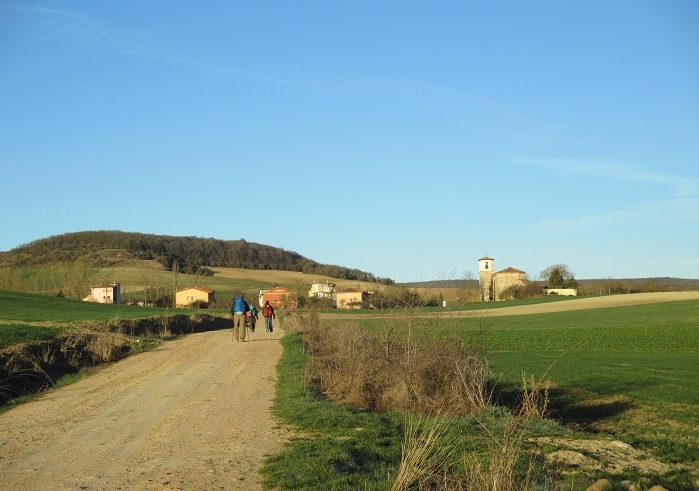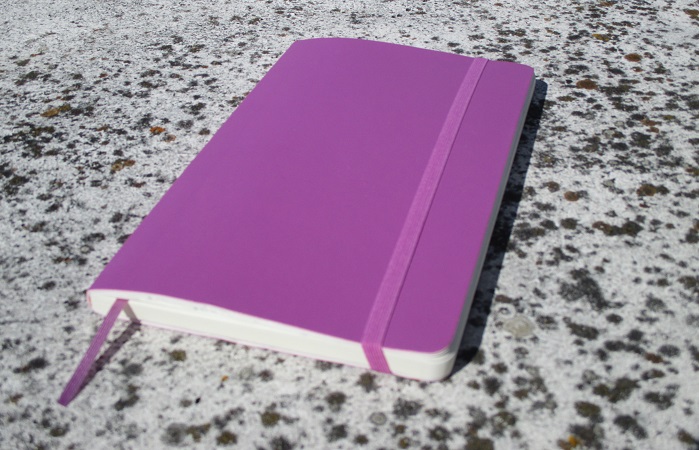- By Sarah
Auf der Suche nach Wahrheit - searching for truth
Vor einem Jahr war ich auf dem Jakobsweg unterwegs, mittendrin in meiner zweimonatigen Pilgerreise, und ich hatte auch schon einiges erlebt. Während der letzten Wochen habe ich oft an meine Reise gedacht. Ich habe als Pilgerin ja fleißig Tagebuch geschrieben, und neulich habe ich an einem Sonntagnachmittag auch meine beiden Tagebücher nochmals gelesen und dabei die Reise somit zumindest teilweise wieder erlebt. Die Tagebücher mit all meinen Gedanken und Erfahrungen sind ein wahrer Schatz, das wurde mir schon während der Reise klar, wo ich zu sagen pflegte: Man kann mir meinen Rucksack und alles klauen, das ist mir egal, aber bitte nicht die Tagebücher, an denen hänge ich wirklich … nun gut, sie sind mir ja erhalten geblieben und haben ihren Platz in meinem Bücherregal.
Am Gründonnerstag (vor genau einem Jahr) habe ich eine sehr prägende Begegnung gehabt: ich habe Michel getroffen, einen katholischen Priester aus Kamerun, der seit vielen Jahren in Rom lebt. Michel ging den Jakobsweg, um Ruhe zu suchen – für einen Priester keine gute Idee, wie sich herausstellte: es gibt auf dem Weg einfach zu viele suchende Menschen mit Rede- und Diskussionsbedarf wie mich, sodass Michel als Priester schnell zu einem gefragten Gesprächspartner wurde, ja sogar bekannt unter den Pilgern, die zeitgleich mit uns auf dem Weg waren.
Jedenfalls hatte ich das große Glück, mit Michel einige Stunden zu verbringen, in denen er sich mit mir unterhielt. Man muss wissen, dass ich katholisch getauft wurde, aber nie Zugang zu dieser Kirche gefunden habe, unter anderem weil es nie eine Person gegeben hat, der ich all meine Fragen stellen und mit der ich diskutieren konnte. Und nun taucht auf dem Jakobsweg ein Priester auf, der so anders ist als alle katholischen Priester, die ich bisher kennen gelernt habe. Einer, der wie er selbst sagte, sieht, „wie sehr ich auf der Suche sei“ und mir alle meine Fragen in Bezug auf die Kirche und noch wichtiger, auf den Glauben, geduldig beantwortet (von Jesus über die nicht so ruhmreiche Geschichte der katholischen Kirche zum Zölibat und anderen Religionen). Eine authentische Person mit einer unglaublich spannenden Geschichte zugleich. Zwei Zitate, die mir wirklich hängen geblieben sind, lauten wie folgt (mit Michel konnte ich Französisch zur Freude von uns beiden Französisch sprechen):
„Il faut défendre la vérité, pas la tradition.“(Man muss die Wahrheit verteidigen, nicht die Tradition). Solche Worte aus dem Munde eines katholischen Priesters – unkonventionell, würde ich mal sagen. So richtig überzeugt, dass es sich um eine Person handelt, die mir viel Interessantes erzählen hat, als er meinte:
„N’arrête jamais de chercher (la vérité), même si tu penses avoir trouvé la solution.“(Höre nie auf, (nach der Wahrheit) zu suchen, auch wenn du meinst, die Lösung gefunden zu haben). An diesen Worten gefällt mir, dass es keine dogmatische Sicht gibt in die Richtung „So ist es, weil ich (oder eine Institution) es dir sage, und du hast es zu glauben.“ Im Gegenteil, es geht für mich darum, zu versuchen, den Dingen auf den Grund zu gehen, und das im Rahmen eines ständigen Prozesses. Die Wege von Michel und mir trennten sich zwischenzeitlich.
Eine sehr amüsante und interessante Feststellung entlang des Jakobsweges war für mich, wie sich bestimmte Gedanken oder Themen, die mich beschäftigten, weiterentwickelten. Manchmal durch das Gespräch mit anderen Leuten und manchmal durch andere Einflüsse. So war ich nach Michels Aussagen mit dem Schlüsselwort „Wahrheit“ beschäftigt. Und zwei Tage später in einer Bar schreibt der Kellner vor meinen Augen den Spruch des Tages mit Kreide an eine Tafel:
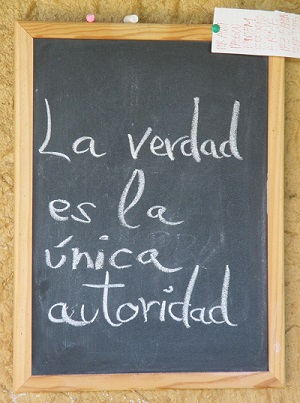
(Die einzige Autorität ist die Wahrheit)
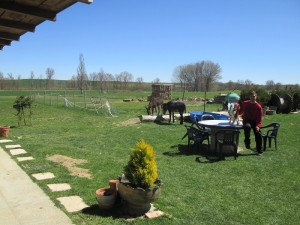
Ein Pärchen, das zeitgleich mit mir in dieser Bar verweilte, fragte nur: „Und was ist die Wahrheit?“. Ich antwortete, dass das wohl jeder für sich selbst herauszufinden versuchen müsse… Nun geht’s in die Richtung des Philosophischen, ist weiß, und ich führe die Geschichte weiter, indem ich anmerke, dass ich Michel nach ein paar Tagen wieder traf, als er in der gleichen Herberge einkehrte wie ich. Ich fühlte mich geehrt, als er mich fragte, ob ich am nächsten Morgen bis nach León mit ihm zusammen gehen wollen würde. Klar doch (in León plante ich übrigens, den Bus nach Norden zu nehmen, um einen etwas weniger bekannten Teil des Jakobswegs zu marschieren, da ich mit den Leuten auf dem Camino Francés in Spanien generell überfordert war und wieder etwas mehr Einsamkeit gesucht habe). Zurück zu Michel. Wir kamen wieder auf die Frage „Was ist Wahrheit?“ zu sprechen und Michel näherte sich der Fragestellung auch auf folgende Art: „ Nehmen wir zum Beispiel ein Telefon: Man nennt den Gegenstand Telefon. Aber ist es wirklich die Wahrheit, dass das ein Telefon ist? Wer hat das festgelegt? Man kann mein Profil sehen und mich beschreiben. Diese Beschreibung wird aber ganz anders aussehen als von jemandem, der mich von Vorne sieht. Wir sehen ja nur eine Perspektive auf einmal. Welche ist wahr? Deshalb gilt es zu suchen und Fragen zu stellen.“ Damit lasse ich Michel’s Aussagen stehen. Ich bin nach wie vor sehr dankbar um diese prägende Begegnung (eine der prägendsten, auch wenn ich noch eine Reihe weiterer Erlebnisse ausführen könnte).
Immer wenn ich nun irgendwo den Begriff „Wahrheit“ wahrnehme, werde ich hellhörig. Zwei Zitate aus Büchern will ich zum Abschluss noch anmerken. Ein Zitat von Henry Thoreau aus einem meiner Lieblingsbücher, welches die Bedeutung der Wahrheit schön wiedergibt:
"I'm going to paraphrase Thoreau here... rather than love, than money, than faith, than fame, than fairness... give me truth."("Anstatt Liebe, Geld, Glauben, Ruhm, Fairness...gebt mir Wahrheit") ( aus dem Buch „Into the Wild“ von Jon Krakauer). Auch wenn es schwer ist Wahrheit zu definieren, so werden uns leider oft bewusst Unwahrheiten aufgetischt, das macht mir dieses Zitat bewusst. Und nun noch ein Zitat aus dem Buch „The fountainhead“ von Ayn Rand. In diesem Roman unterteilt die Autorin Menschen in Schöpfer und Nachmacher („Seconders“ - Menschen, deren Lebensentwürfe stark von den Ansichten der anderen beeinflusst werden). Und über Seconders wird gesagt:
“They have no concern for facts, ideas, works. They’re concerned only with people. They don’t ask: Is it true? They ask: Is this what others think is true?”(Sie kümmern sich nicht um Tatsachen, Ideen, Arbeiten. Sie kümmern such nur um Menschen. Sie fragen nicht: ist das wahr? Sie fragen: denken andere, dass dies wahr ist?).
Für mich ist diese „Suche nach der Wahrheit“ schlichtweg ein Plädoyer dafür, Dinge zu hinterfragen. Und das ständig und immer wieder. Sowie dafür, offensichtliche Unwahrheiten/Lügen nicht einfach zu akzeptieren.
 Zwischenrein ein paar Bilder von der "Meseta" in Nordspanien am Gründonnerstag 2015 aufgenommen ... ausnahmsweise keine Schwarzwaldbilder
Zwischenrein ein paar Bilder von der "Meseta" in Nordspanien am Gründonnerstag 2015 aufgenommen ... ausnahmsweise keine Schwarzwaldbilder
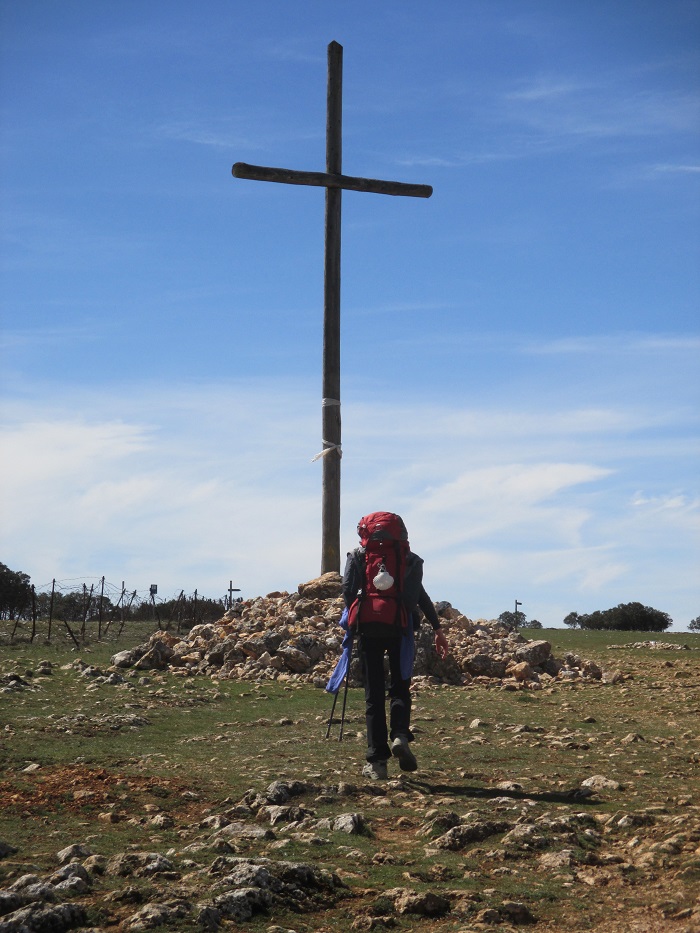 Exceptionally no pictures fro the Black Forest, but from the "Meseta" in Northern Spain .. taken exactly one year ago
Exceptionally no pictures fro the Black Forest, but from the "Meseta" in Northern Spain .. taken exactly one year ago
One year ago, I have been walking on the Camino de Santiago, in the middle of my two-month long pilgrimage and I had already experienced a lot. During the last weeks, I have been thinking a lot of my journey. As a pilgrim, I diligently kept a diary, and I recenlty sat down on a Sunday afternoon to read both of my diaries again. I kind of have been living the trip again... My diaries with all my thoughts and experiences are a real treasure - I have already become aware of this during my journey, when I used to say: you can steal my backpack and all my other belongings, but please do not touch my diaries, these are really valuable to me... well, they have remained with me and they have their place in my bookshelf.
On Holy Thursday (exactly one year ago), I have had an influental encounter: I have met Michel, a catholic priest from Camerun, who has been living in Rome for many years. Michel went on the Camino searching for some quiet - as it turned out, not a good idea for a priest: there are just too many searching people with the need to talk and discuss like me, rendering Michel a very sought-after conversation partner. He even got known among the pilgrims hiking at the same time as we did .
Anyway, I had the chance to spend a few hours talking to Michel. You have to know that I have been baptized into the catholic chrurch, but I never found access to this institution, amongst other things because I have never met a person there I could ask my questions and discuss with. And then, in the middle of the Camino de Santiago, a catholic priest appears, so different from any other catholic priest I have ever met. One who, according to his own words, saw "how much I was searching" and who patiently answered all my questions with respect to the church and faith (from Jesus to the not so glorious history of the catholic church, to the celibacy and other religions). An authentic person with an incredibly fascinating story. Two quotes by Michel have truly remained with me, and they are as follows (I could speak French with Michel to the joy of both of us):
„Il faut défendre la vérité, pas la tradition.“(One has to defend truth, not tradition). Such words from the mouth of a catholic priest - unconventional, as I'd say. And I have been truly convinced to be talking to a person who really has to say something to me, when he went on:
„N’arrête jamais de chercher (la vérité), même si tu penses avoir trouvé la solution.“(Never stop searching (the truth), even if you think that you have found the solution). What I particularily like about these words is that they don't express some dogmatic view like "It's like this because I (or an institution) tell(s) you and you have to believe it.“ On the contrary, for me, it's about trying to get to the bottom of the matters, and this as a constant process. Michel and I took separate ways in the meantime.
I found it very amusing and interesting that along the Camino, some thoughts and topics I dealt with, seemed to develop in a very natural way. Sometimes talking to other people, but sometimes to different influences. Since the encounter with Michel, I have been thinking about the keyword "truth". And two days later in a bar, the waiter writes down with chalk on a blackboard the saying of the day right before my eyes:

(The only authority is truth)

A Spanish couple being in the bar just asked: "And what is the truth?" I answered that it would probably be up to each one of us to trying to find this out .... it's getting philosophical now, I know and I continue the story telling that I have met Michel again a few days later in a hostel. I feld honoured when he asked me if I felt like walking together with him to León the next morning. Of course (I had planned to take the bus north from León to follow another, less popular Camino, because the people on the Camino Francés have just been too many for my taste and I was searching for more solitude). Back to Michel. We touched the question "What is truth?" Michel approached it the following way: „Let's take the example of a telephone: you call it a telephone. But is it really the truth, that this is a telephone? Who declared that? Or: you can see my profile and describe it. But this description of me would look different if you saw me from the front. We can only see one perspective at once. Which one is true? That's why we need to search and ask questions." I leave Michel's statements like this. I just want to point out again how thankful I still am for this encounter (one of the most special ones on the Camino, but I could mention a few others as well).
Everything I notice the word "truth" somewhere, I pay attention. I want to mention two quotes from books to finalize this article. One is from Henry Thoreau, but I read it in one of my favourite books which is "Into the wild" by Jon Krakauer.
"I'm going to paraphrase Thoreau here... rather than love, than money, than faith, than fame, than fairness... give me truth."Even if it is hard to define truth, we deliberately get dished up so many untruths. This is what comes to my mind reading this quote. And another quote from the book „The fountainhead“ by Ayn Rand. In this novel, the author distinguishes between "creators" and „seconders“, the latter being people whose life plans are influnced heavily by what others think. And she says about seconders:
“They have no concern for facts, ideas, works. They’re concerned only with people. They don’t ask: Is it true? They ask: Is this what others think is true?”For me, this search for truth is simply a plea for questioning things. And this constantly and repeatedly. And for not accepting obvious untruths/lies.
